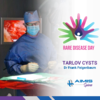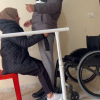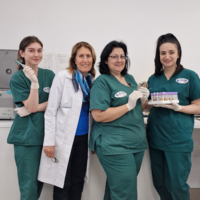.png)
Parkinson's Awareness Month marks an annual effort to increase understanding of Parkinson's disease, a progressive neurological condition impacting millions globally. Let's try to comprehend Parkinson's by addressing common queries and exploring the role of neuromodulation as a breakthrough method for managing symptoms and enhancing patients' well-being.
What is Parkinson's disease?
Parkinson's disease is a progressive neurological disorder primarily affecting movement. It arises when neurons in the brain responsible for producing dopamine, a vital chemical messenger for smooth muscle movements, become impaired or degenerate. This leads to various motor symptoms such as tremors, stiffness, slowed movement, and compromised balance.
What causes Parkinson's disease?
Though the exact cause remains elusive, Parkinson's is thought to result from a blend of genetic and environmental factors. Certain genetic mutations and exposure to environmental toxins are implicated, but further research is essential for a comprehensive understanding.
Is Parkinson's disease hereditary?
While most cases are not directly inherited, a family history can elevate one's risk. Specific genetic mutations associated with Parkinson's may be passed down, but inheriting them doesn't guarantee the disease's onset.
Can Parkinson's disease be cured?
Presently, there's no cure, but various treatments aim to manage symptoms and enhance quality of life. These include medication, physical and speech therapy, and more recently, neuromodulation.
What is neuromodulation, and how does it improve Parkinson's disease?
Neuromodulation entails using electrical or magnetic stimulation to regulate nervous system activity. In Parkinson's, it shows promise in alleviating motor symptoms and reducing medication reliance in inadequately controlled patients.
Moreover, advancements in neuromodulation offer tailored solutions, adapting stimulation parameters based on real-time neural activity through closed-loop systems. This holds the potential for optimizing treatment outcomes and minimizing side effects.
During Parkinson's Awareness Month, it's vital to spotlight not just the challenges but also the innovative therapies like neuromodulation, offering improved symptom management and enhanced quality of life. Continued research and advocacy are crucial for advancing understanding and developing more effective treatments, ultimately aiming for a cure.
As we observe Parkinson's Awareness Month, it's crucial to not only raise awareness about the challenges faced by individuals living with Parkinson's disease but also to highlight the innovative therapies and treatments that offer hope for a better future. Neuromodulation, represents a valuable tool in the management of Parkinson's symptoms, offering improved symptom control and enhanced quality of life for patients. Through ongoing research and advocacy efforts, we can continue to advance our understanding of Parkinson's disease and work towards more effective treatments and, ultimately, a cure.









